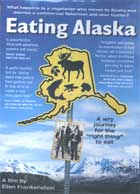
Eating Alaska 2009
Distributed by New Day Films, 190 Route 17M, P.O. Box 1084, Harriman, NY 10926; 888-367-9154 or 845-774-7051
Produced by Ellen Frankenstein
Directed by Ellen Frankenstein
DVD, color, 56 min.
Jr. High - Adult
Bioethics, Environmental Studies, Ethics, Native American Studies, Politics of Food, & Sustainable Agriculture
Date Entered: 05/20/2011
Reviewed by Winifred Fordham Metz, University of North Carolina at Chapel HillIn her documentary Eating Alaska, Ellen Frankenstein has crafted a heartfelt personal journey – equal parts ethical gastronomy, travel adventure, and most assuredly a lesson in self-discovery.
A child of the east coast, Ellen grew up experiencing a typical suburban lifestyle, obediently consuming food her mom selected, bought and cooked. As a teenager, Ellen took a more proactive stance, developed a social conscious with regard to her food choices and became a vegetarian. Years later, when work took her to the wilds of Alaska and she met her life partner Spencer, a commercial fisherman and hunter, she was forced to examine her food choices anew.
In Alaska, Ellen quickly learns that eating “close to home” is essential. Her new lifestyle demands a combination of living off the land via garden and game (i.e. fishing, hunting). This raises many questions – primarily revolving around redefining an ethical way to eat reflective of where you live. For Ellen, this is particularly troublesome with regard to her vegetarian lifestyle. The film spends considerable time investigating a new understanding of how people relate to where they live and what they put in their stomachs. From attending Kake Culture Camps, to goat hunting with her girlfriends, to deep sea fishing with Spencer, Ellen comes to embrace the lifestyle of living (and eating) off the land in Alaska.
Throughout the documentary, Ellen’s light touch and humor make an unquestionably difficult topic both accessible and encouraging. At no time, does she dictate. She instead offers opportunities of engagement with health educators, native Alaskans, wild game hunters, fishermen, and farmers. The result is an introspective review of the politics and economics of food in areas far afield of the city and suburb. And, the audience is afforded entre to Ellen’s own solutions for eating ethically and sustainably in her community of Sitka Alaska.
This film is recommended for people interested in bioethics, environmental studies, ethics, Native American studies, politics of food, and sustainable agriculture. Film may easily be used in Jr. High School classrooms and higher to motivate discussions on these and other similar topics.